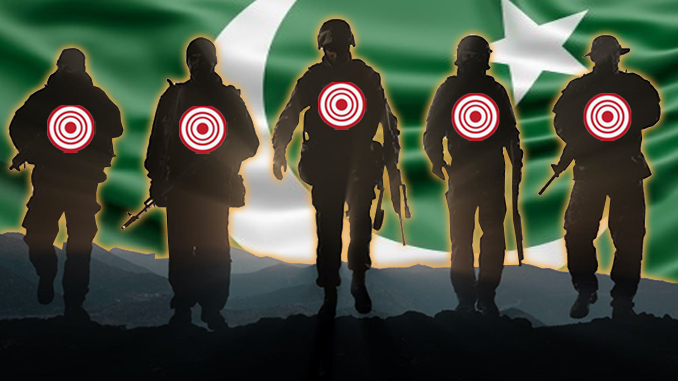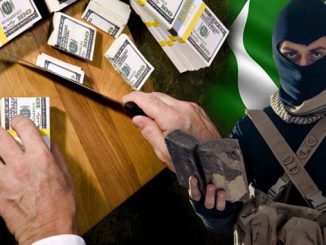
By Richard Walker
The growing controversy over the claim that Russia offered bounties for U.S. soldiers in Afghanistan has split American public opinion, while little effort has been made to identify other potential culprits. Meanwhile, Congress has failed to recognize that there is sufficient evidence that the term “bounty” is more a media fabrication than a reality.
For some time, U.S. generals have suspected that the Taliban was being paid to kill American military personnel, but they did not suspect Russia. Instead, they were aware that the Taliban was being financed by shadowy figures within Pakistan’s military-intelligence structures and the Haqqani network, the group some experts studying the Taliban call the head of the snake. Haqqani is a powerful organization run by Pakistan’s Inter-Services intelligence agency and has killed U.S. soldiers. During the Obama presidency, it was named by top U.S. political figures as a scourge of the U.S. military. In 2011, Adm. Mike Mullen called out the Haqqani group and its links to Pakistan. Since then, Haqqani bosses have funneled money to the Taliban to keep the war going in the belief that the more U.S. troops you kill the longer the war will last, and Washington will be forced to commit more forces to protect the ones already in country. The strategy of troop surges has been a defining factor of the war over two decades. To have the Taliban kill U.S. troops also makes a negotiated peace between the Taliban and Washington a longer-term project.
If one looks for a reason why Pakistan and the Haqqani network would finance the Taliban to kill Americans, one has to look at the core of the Afghan crisis and how Pakistan has benefited financially. So, too, have the Haqqani network and many shadowy middlemen. All of them have become filthy rich, thanks to a Washington policy during the Bush and Obama years of flooding Afghanistan with dollars.
The media has forgotten that a year ago The Washington Post published the “Afghan Papers,” a secret history of the war, exposing the corruption that defined it. In the “Afghan Papers,” a military task force accountant, Gert Berthold, revealed that during 2010 to 2012 more than 40% of $106 billion of U.S. defense contracts was siphoned off by corrupt politicians and middlemen. Hamid Karzai, the former Afghan leader, is on record admitting that the CIA regularly dumped bags of dollars in his office and that it was “nothing unusual.” When this kind of money is floating around there is an incentive for bad actors to pay the Taliban to kill U.S. soldiers to keep the war going so that Washington money keeps flowing. America’s foreign wars, especially those in Iraq and Afghanistan, have cost close to $3 trillion, and much of that has ended up in Afghanistan with little or no oversight.
It is only fair to point out that there is cause to worry about Russia’s role in Afghanistan because it is a shadowy one and is not in America’s best interests. Moscow has been secretly supporting the Taliban militarily and financially. This is seen by U.S. intelligence agencies as revenge for America’s support for the Afghan Mujahideen when Russia occupied the country from 1979 to 1989. American military aid during that period resulted in the deaths of tens of thousands of Russian soldiers. In May 2018, the killing of more than 200 Russian mercenaries in Syria by U.S. Special Forces deeply angered Vladimir Putin. Some in the U.S. military leadership have been expecting a response, even in Afghanistan.

So could Russia have paid bounties to the Taliban to kill U.S. soldiers? One could reword the question as follows: Is it possible that Russian financial and military support to the Taliban resulted in the deaths of U.S. military personnel? The answer is yes, and this essentially makes the word “bounty” irrelevant. Russia has funneled money to the Taliban, but so, too, have Pakistan and its Haqqani allies. To call what they did as offering bounties is misleading.
Russia, like China, has a deep, abiding interest in Afghanistan. It is not just because it is in its backyard, but because Afghanistan holds massive supplies of oil, gas, and other natural elements. In 2002, Russia made it clear it retained that interest. In 2015, Kabul Zamir, Moscow’s Kabul envoy, declared that Russia backed Taliban fighters and was giving them intelligence to help them battle ISIS elements in parts of the country.
With so many players in the mix, the Trump administration is trying, unsuccessfully, to bring an end to the war. The bounty saga has obscured the fact that the Taliban has been talking tough with Secretary of State Mike Pompeo, believing they have the upper hand. They have demanded the release of Taliban figures from Guantanamo and a drug lord presently held in a U.S. prison.
Richard Walker is the nom de plume of a former New York mainstream news producer who grew tired of seeing his articles censored by his bosses.





Now you know,why we call you,the United ( zionist) Snakes as the great USAtan! Most of lies and agressions goes from this evil country!
If it doesn’t stick on one nation let’s try this narrative on another.